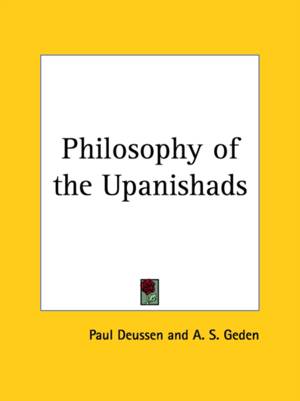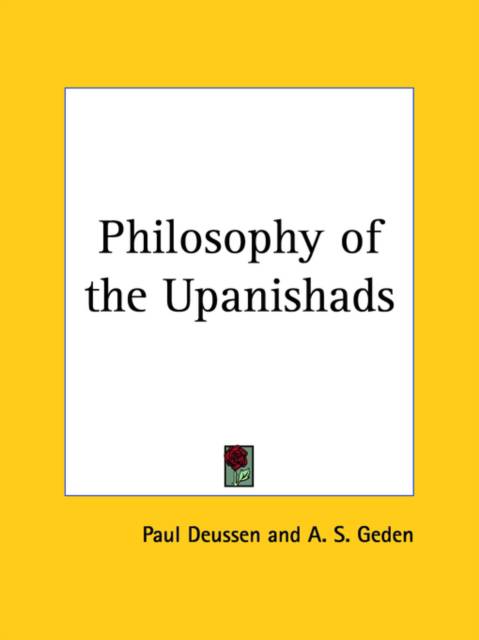
- Afhalen na 1 uur in een winkel met voorraad
- Gratis thuislevering in België vanaf € 30
- Ruim aanbod met 7 miljoen producten
- Afhalen na 1 uur in een winkel met voorraad
- Gratis thuislevering in België vanaf € 30
- Ruim aanbod met 7 miljoen producten
Zoeken
Omschrijving
The Philosophy of the Upanishads is a comprehensive book written by Paul Deussen that delves into the philosophical teachings of the Upanishads, a collection of ancient Hindu texts that explore the nature of reality, the self, and the ultimate goal of human existence. The book is divided into three parts, each of which examines a different aspect of Upanishadic philosophy. In the first part, Deussen provides an overview of the Upanishads and their historical context, explaining their significance in the development of Hindu philosophy and their influence on other religious traditions. He also discusses the various themes and concepts that are central to Upanishadic thought, such as Brahman, Atman, and karma.The second part of the book focuses on the major Upanishads themselves, providing detailed analyses of their key teachings and exploring their philosophical implications. Deussen examines each Upanishad in turn, discussing its structure, themes, and underlying philosophical ideas.Finally, in the third part of the book, Deussen offers a broader perspective on Upanishadic philosophy, considering its relationship to other philosophical traditions and exploring its relevance to contemporary philosophical debates. He also discusses the ways in which Upanishadic thought has influenced Western philosophy and spirituality.Overall, The Philosophy of the Upanishads is a comprehensive and insightful exploration of one of the most important and influential philosophical traditions in human history. It is an essential resource for anyone interested in Hindu philosophy, comparative religion, or the history of ideas.1908. This treatise on the Upanishads illustrates the teaching of the ancient Indian seers and is presented in the clearest light, and claims the sympathetic study of all lovers of truth. It discussed the philosophy of the Upanishads, the culminating point of the Indian doctrine of the universe. Divided into five parts entitled: introduction to the philosophy of the Upanishads; Part I: theology, or the doctrine of Brahman; Part II: cosmology, or the doctrine of the universe; Part III: psychology, or the doctrine of the soul; Part IV: eschatology, or the doctrine of transmigration and emancipation, including the way thither (practical philosophy).This scarce antiquarian book is a facsimile reprint of the old original and may contain some imperfections such as library marks and notations. Because we believe this work is culturally important, we have made it available as part of our commitment for protecting, preserving, and promoting the world's literature in affordable, high quality, modern editions, that are true to their original work.
Specificaties
Betrokkenen
- Auteur(s):
- Uitgeverij:
Inhoud
- Aantal bladzijden:
- 444
- Taal:
- Engels
Eigenschappen
- Productcode (EAN):
- 9780766154704
- Verschijningsdatum:
- 20/05/2003
- Uitvoering:
- Paperback
- Formaat:
- Trade paperback (VS)
- Afmetingen:
- 221 mm x 267 mm
- Gewicht:
- 993 g

Alleen bij Standaard Boekhandel
+ 105 punten op je klantenkaart van Standaard Boekhandel
Beoordelingen
We publiceren alleen reviews die voldoen aan de voorwaarden voor reviews. Bekijk onze voorwaarden voor reviews.











